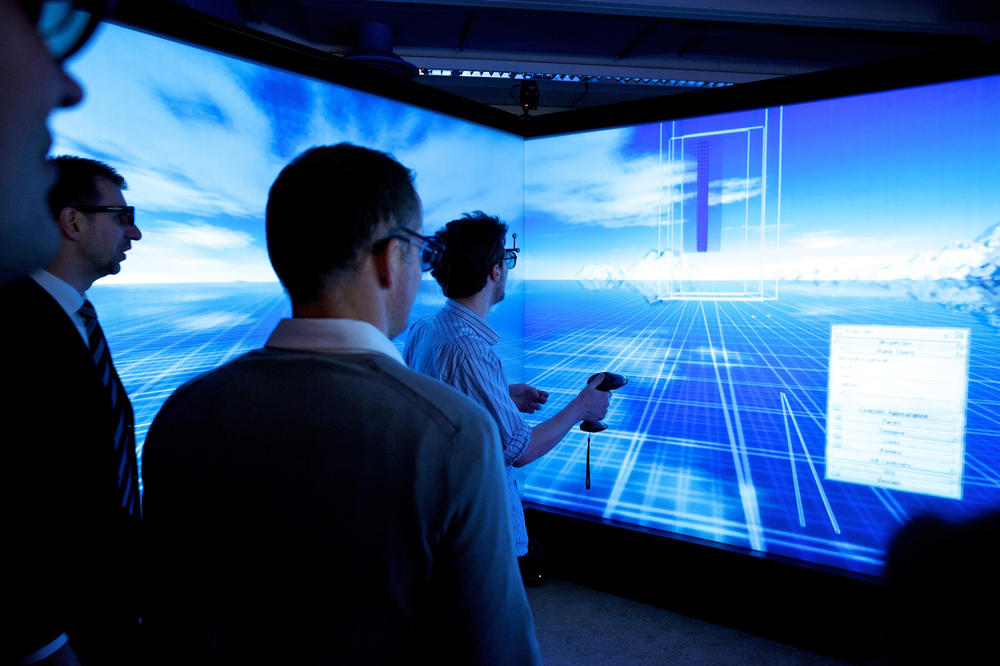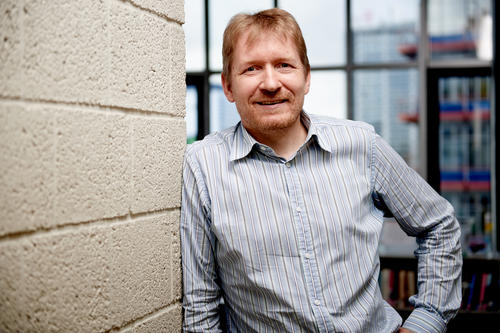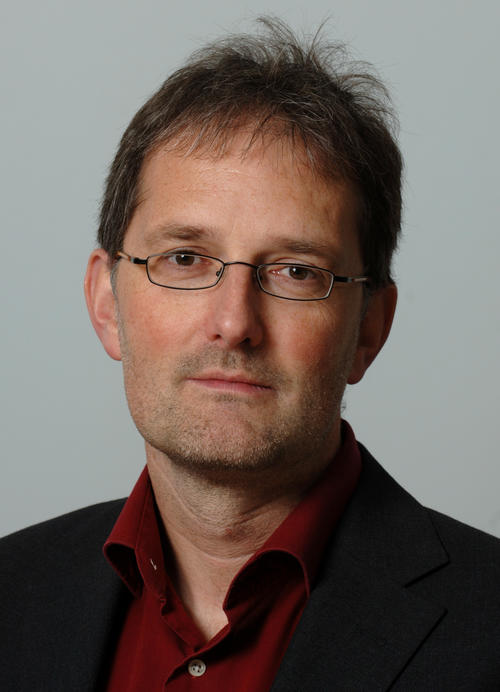“Berlin deserves the best”
15 years of Matheon: an interview on the subject of mathematics for problem solving, the competition for talent, and the future of the Matheon center.
Nov 15, 2017
Math gives us a different perspective on the world: at Matheon’s 3D laboratory, researchers can immerse themselves interactively in various scenarios using special 3D glasses that permit spatial referencing. This allows them to “explore” geometrical
Image Credit: Matheon
“Berlin mathematics” is fast becoming a brand, and Matheon is one of the top institutions for applied math in the world. The center illustrates just how successful a pooling of efforts by the three major Berlin universities can be. An interview with two Matheon spokespersons, Professor Martin Skutella of Technische Universität and Christof Schütte of Freie Universität.
Mr Skutella, Mr Schütte, what is Matheon’s “mission”?
Skuttella: Math is a motor for innovation. The purpose of Matheon is to promote innovation, mainly in technology, through math. There are historical reasons for this. When Matheon was founded 15 years ago as a research organization within the Deutsche Forschungsgemeinschaft (German Research Foundation), it was in response to the DFG’s call for a center that should be primarily application-oriented, specifically in the engineering sciences. They had not envisaged a pure math institution. We competed with similar enterprises and were awarded the contract.
Was there a need, a “shortfall” of math in key technologies?
Schütte: Yes, a quite marked one at the time of Matheon’s establishment. Over 15 years, there has been a great improvement. Mathematics has become established in many areas, and operators seek out mathematicians to help them solve complex problems. Math has acquired a wholly different status.
Skutella: Back then, you had to go from door to door and convince people in companies that math could provide answers. Now the situation has reversed: people come to us, and we are in demand as trouble-shooters.
Martin Skutella is Einstein Professor of Mathematics and Computer Science at the Institute of Mathematics, Technische Universität Berlin, and spokesperson for Matheon.
Image Credit: TU Berlin/PR/Philipp Arnoldt
Can you give us some examples?
Skutella: Traffic problems in large cities is one example. At Matheon, we have optimized both the Berlin bus transport system and the subway synchronized timetables. Now, when connecting with other trains, passengers don’t lose as much time. But there is much more: technical development is forging ahead. Think, for example, about smart phone navigation systems and similar devices in cars; there is a huge amount of math and rapid algorithms involved behind the scenes. The future will be in autonomous driving: completely new challenges will present themselves in connection with traffic control. Operators will expedite entire vehicle fleets through our transport networks and likely control them from a central point. Here, math’ games theory can be applied: many “players” want to get to a destination, each thinking of their own needs – yet having to take care, if the system is to function. So, there is no shortage of challenges!
Schütte: One of the large gas distribution operators is involved in a project with us and has commissioned a kind of navigator for gas distribution systems. How should the gas in pipelines be pumped so that it arrives where it is needed? Where should pumping stations and distributors be located? There are a host of factors to take into account; even weather plays a part, because it impacts on the temperature and thus the flow velocity of the gas. The upshot will be someone sitting in a control center, navigating gas flow using our mathematical recommendations. Another example: together with Charité, we have designed a drug by computer alone. It is going through clinical testing and so far, looks to be proving its worth.
Christof Schütte is a professor in the Department of Mathematics and Computer Science at Freie Universität Berlin, the president of Zuse Institut Berlin (ZIB), and deputy spokesperson for Matheon.
Image Credit: Matheon
Where is Berlin math today?
Schütte: Much has changed. Matheon has helped ensure that Berlin is one of the three top locations in the world for applied mathematics. There are five math institutions in the city – three in the universities and two non-university institutions, the Weierstrass Institute for Applied Analysis and Stochastics, and Zuse Institute Berlin (ZIB). Over 15 years, we have grown together. Today, the whole world talks of Berlin math as top-ranking. Sometimes at conferences, my name tag says “Berlin University.” That is the view from beyond Germany!
Skutella: We are truly proud of it. Together, we achieve far more than any single institution can and together, we can enjoy success. In this respect we are an example for Berlin universities to follow.
What do you see as the major themes in future?
Skutella: The way data are assembled and gathered in many areas is changing society. I see a lot of challenges in this area.
Schütte: We have been addressing the topic of “math in key technologies” for a long time, and quite intensively. Things are broadening out however – we’re heading more in the direction of social sciences and consultancy for companies and politicians. Take the example of global warming – here, math can help to devise prognoses, such as how climate change is having an impact on economic processes.
Artificial intelligence is seen as a risk. Will machines take over one day?
Skutella: This is of course a fascinating topic – made popular in films. But to me, the horror scenarios are completely overblown, at least for the next few decades. These technologies offer us amazing opportunities, which we should utilize. Only, one has to understand the mathematical models on which, for example, autonomous vehicles are based before we can achieve satisfactory results for everyone in the end. We need an understanding of new technologies so that we can develop them in a sensible direction.
Schütte: I don’t think society will be governed by some kind of AI in 20 years. But I do believe that the market power of certain enterprises with access to global data flows will continue to grow. Publicly financed research shouldn’t leave the field to Google without a fight! We need to have a presence here. In medicine, for instance, the issue is not about the “transparent” human, but about the possibility of detecting cancer much earlier through the use of a good database. I would be far happier if the vital research could be done by publicly financed institutions rather than by private providers.
The shortest flight path may not always be the most economical. An example of a calculation of the most efficient flight path from Taipei to New York, Boeing B777-300ER, April 25, 2017, taking into account the global wind field on that day (at right)
Image Credit: VOLAR-Projekt
What are the prospects for funding young talent in the sciences?
Schütte: Together with Berlin Mathematical School, a joint graduate school of the Berlin universities, we are well-positioned. Of course, we want the very best people to come to Berlin. It’s a great help that the city is extremely attractive to young people.
But will they be enticed away by private business?
Schütte: We are actually thrilled by some of the head-hunting that goes on. Since Matheon was founded, more than 100 of our employees have been appointed to professorships. That’s quite a record! But many go to industry even before they have finished their final thesis and this is also heartening. We can’t train our young colleagues fast enough, and they are being grabbed from under our noses!
Skutella: On the other hand, we receive applications for doctoral positions from amazingly talented people. We might offer an excellent young mathematician a place but Harvard and Princeton will perhaps be interested, too. It’s not unusual for them to choose us. We are of course very proud of this.
The DFG funding ran out in 2014 and since then funding has been provided by the state of Berlin. But this means significantly less money: Is this a problem?
Skutella: It means we are no longer in a position to back all the good ideas, unfortunately. We’re in a transition phase and hope to be successful within the German government’s Excellence Strategy for universities. We are thinking about a Berlin center for math research, which will go under the name “Math+”. In September 2017 we were invited to submit a full proposal. A decision will be made in September 2018 as to whether Berlin will host the Math+ Cluster of Excellence.
Schütte: We hope to continue Matheon’s success story: to keep up on the international front, the new center should be of a certain size.
As a subject in school curriculums, math is not particularly popular. You’ve made an effort to raise public awareness of the subject.
Skutella: I think we have managed very well: a good many initiatives were successful. We created a math “Advent calendar,” which has been running for over 10 years. Instead of chocolate, it features mini math challenges as well as more extensive challenges for upper secondary pupils. It has a huge following, with international participant numbers in the five figures. It is going to be published in English now, too. We also stage events for a wider public of interested people on the topic of math and music, which is called “Math sounds good”. We present our work at Urania, a scientific society in Berlin, which aims to communicate scientific knowledge and new findings to a broad public, and we’ve instigated the Matheathlon for students, which involves running and solving math problems, rather like a biathlon. It has enjoyed great acclaim in Berlin schools.
Schütte: And around a million school pupils have taken part in the Advent calendar challenge. This goes to show that math may be a subject that inspires fear in some, but that there are children who are captivated by it. It is simply a matter of framing ideas the right way. We should not forget to mention the German Centre for Mathematics Teacher Education, which we set in motion in collaboration with the Deutsche Telekom Foundation. Here, efforts are made in the field of modern methods of teaching math.
You use math as a tool for solving technical problems. What do you think of the idea that our world, and in fact the entire universe, is based on math? This is a theory expounded by Max Tegmark, for instance.
Skutella: Galileo was known to have said that the book of nature is written in the language of mathematics. There are many things in our environment, and indeed in the universe, that can be described in mathematical terms. But there are also things inaccessible to math. One example is music. On the one hand there is a certain amount of overlap, but math cannot explain why music is so fascinating.
Schütte: Gödel’s incompleteness theorem shows, crudely put, that a complex mathematical theorem cannot in itself be shown to be free of contradictions. In other words, math has limitations. Mathematics allows an objective, highly factual view of the world, which is its great advantage. It permits no self-deception – either a situation is true or false, there is no gray area. So, one has to nail one’s colors to the mast!
An interview by Hartmut Wewetzer.
This text was originally published on November 15, 2017, in German in a special supplement to the Berlin daily newspaper Der Tagesspiegel, which was devoted to mathematics in Berlin.




